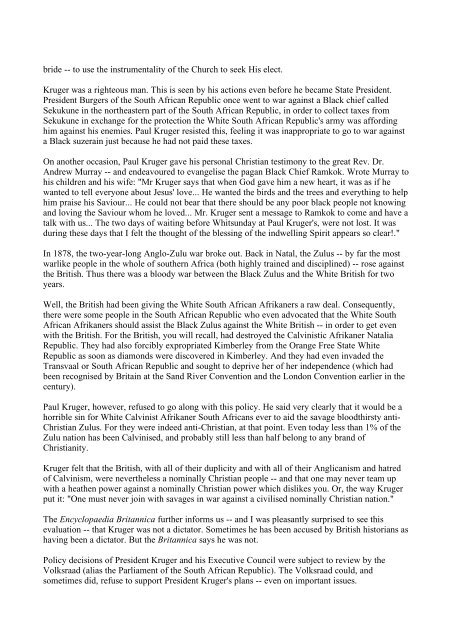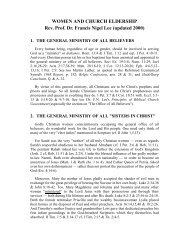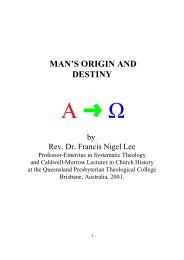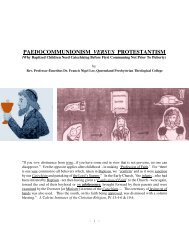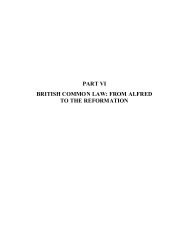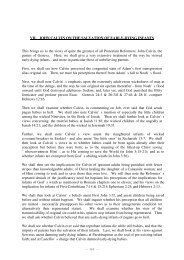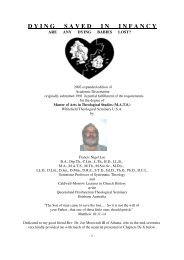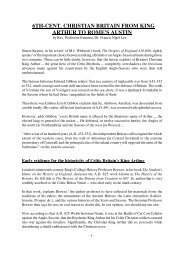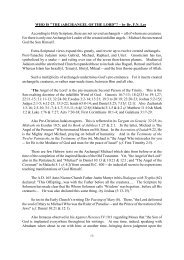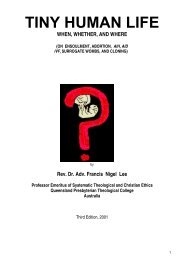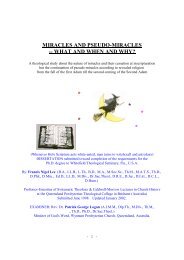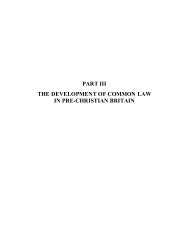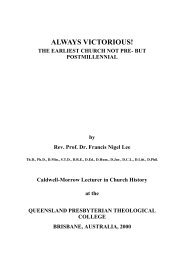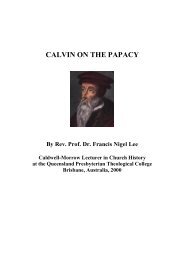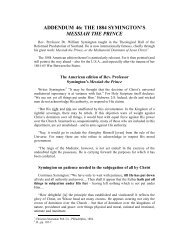THE CHRISTIAN AFRIKANERS - The Works of F. N. Lee
THE CHRISTIAN AFRIKANERS - The Works of F. N. Lee
THE CHRISTIAN AFRIKANERS - The Works of F. N. Lee
Create successful ePaper yourself
Turn your PDF publications into a flip-book with our unique Google optimized e-Paper software.
ide -- to use the instrumentality <strong>of</strong> the Church to seek His elect.Kruger was a righteous man. This is seen by his actions even before he became State President.President Burgers <strong>of</strong> the South African Republic once went to war against a Black chief calledSekukune in the northeastern part <strong>of</strong> the South African Republic, in order to collect taxes fromSekukune in exchange for the protection the White South African Republic's army was affordinghim against his enemies. Paul Kruger resisted this, feeling it was inappropriate to go to war againsta Black suzerain just because he had not paid these taxes.On another occasion, Paul Kruger gave his personal Christian testimony to the great Rev. Dr.Andrew Murray -- and endeavoured to evangelise the pagan Black Chief Ramkok. Wrote Murray tohis children and his wife: "Mr Kruger says that when God gave him a new heart, it was as if hewanted to tell everyone about Jesus' love... He wanted the birds and the trees and everything to helphim praise his Saviour... He could not bear that there should be any poor black people not knowingand loving the Saviour whom he loved... Mr. Kruger sent a message to Ramkok to come and have atalk with us... <strong>The</strong> two days <strong>of</strong> waiting before Whitsunday at Paul Kruger's, were not lost. It wasduring these days that I felt the thought <strong>of</strong> the blessing <strong>of</strong> the indwelling Spirit appears so clear!."In 1878, the two-year-long Anglo-Zulu war broke out. Back in Natal, the Zulus -- by far the mostwarlike people in the whole <strong>of</strong> southern Africa (both highly trained and disciplined) -- rose againstthe British. Thus there was a bloody war between the Black Zulus and the White British for twoyears.Well, the British had been giving the White South African Afrikaners a raw deal. Consequently,there were some people in the South African Republic who even advocated that the White SouthAfrican Afrikaners should assist the Black Zulus against the White British -- in order to get evenwith the British. For the British, you will recall, had destroyed the Calvinistic Afrikaner NataliaRepublic. <strong>The</strong>y had also forcibly expropriated Kimberley from the Orange Free State WhiteRepublic as soon as diamonds were discovered in Kimberley. And they had even invaded theTransvaal or South African Republic and sought to deprive her <strong>of</strong> her independence (which hadbeen recognised by Britain at the Sand River Convention and the London Convention earlier in thecentury).Paul Kruger, however, refused to go along with this policy. He said very clearly that it would be ahorrible sin for White Calvinist Afrikaner South Africans ever to aid the savage bloodthirsty anti-Christian Zulus. For they were indeed anti-Christian, at that point. Even today less than 1% <strong>of</strong> theZulu nation has been Calvinised, and probably still less than half belong to any brand <strong>of</strong>Christianity.Kruger felt that the British, with all <strong>of</strong> their duplicity and with all <strong>of</strong> their Anglicanism and hatred<strong>of</strong> Calvinism, were nevertheless a nominally Christian people -- and that one may never team upwith a heathen power against a nominally Christian power which dislikes you. Or, the way Krugerput it: "One must never join with savages in war against a civilised nominally Christian nation."<strong>The</strong> Encyclopaedia Britannica further informs us -- and I was pleasantly surprised to see thisevaluation -- that Kruger was not a dictator. Sometimes he has been accused by British historians ashaving been a dictator. But the Britannica says he was not.Policy decisions <strong>of</strong> President Kruger and his Executive Council were subject to review by theVolksraad (alias the Parliament <strong>of</strong> the South African Republic). <strong>The</strong> Volksraad could, andsometimes did, refuse to support President Kruger's plans -- even on important issues.


